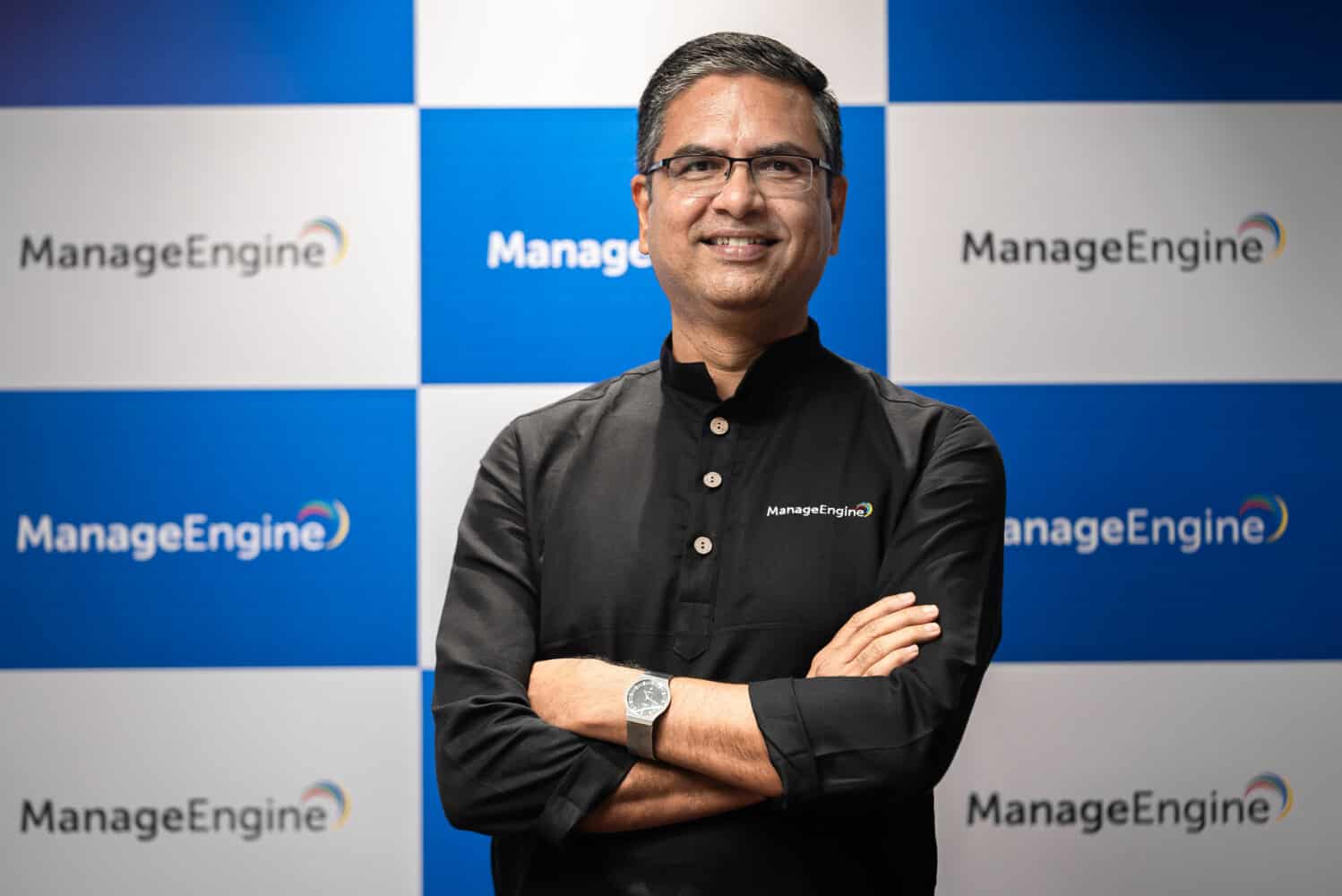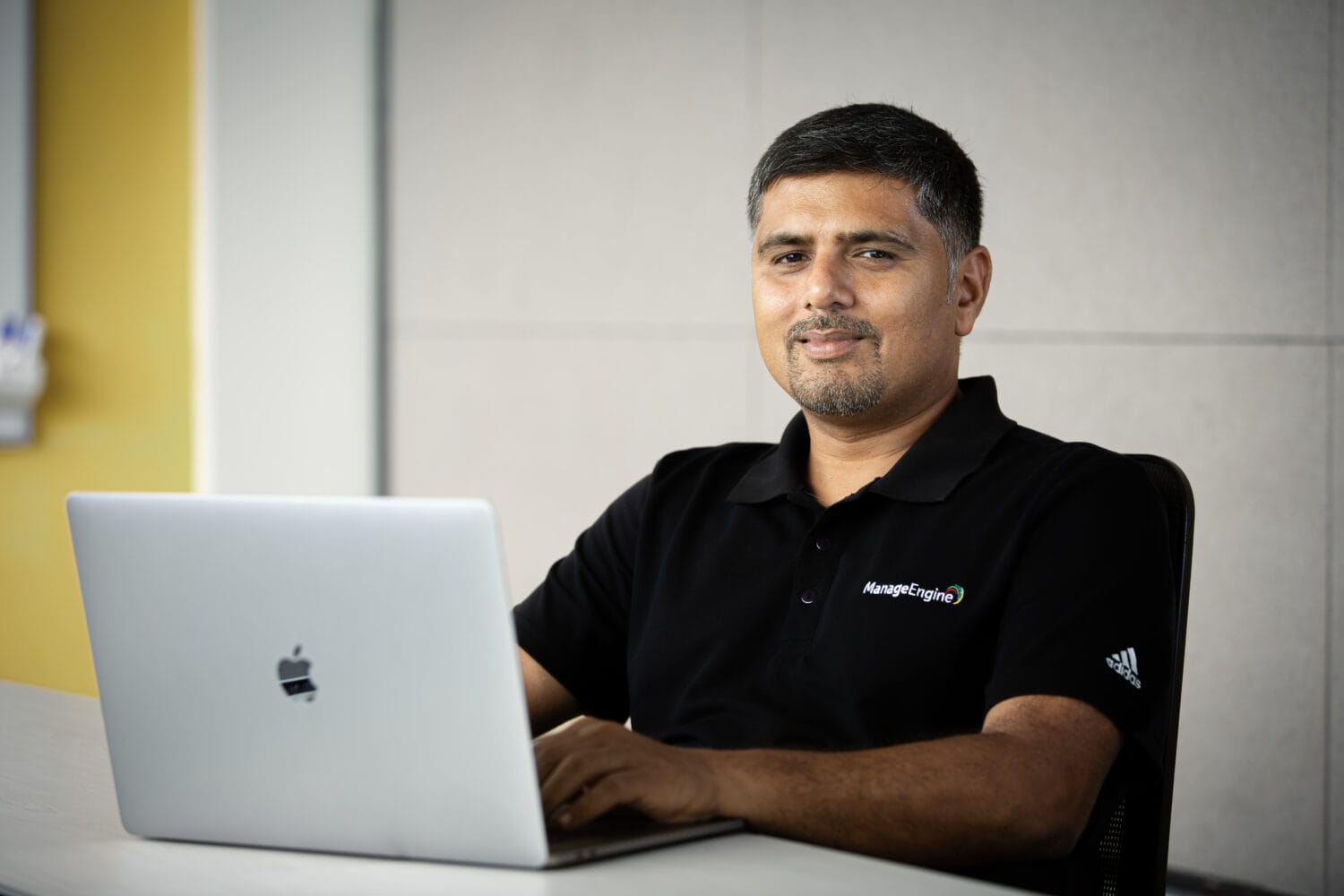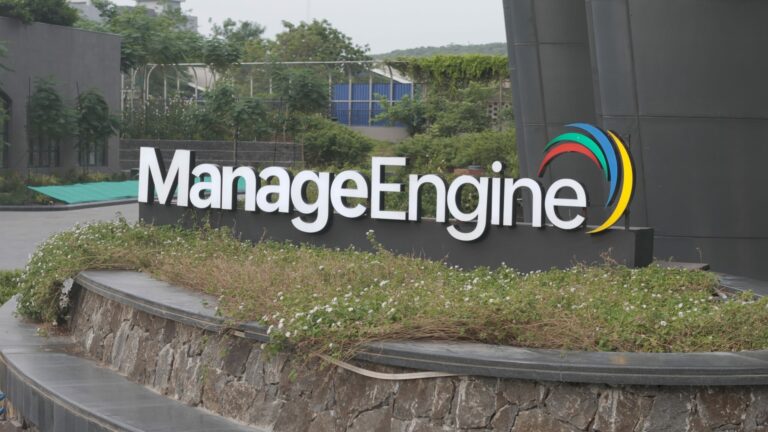India’s ManageEngine is poised to gain a firmer foothold in Europe, as in the rest of the world for that matter. It sees growth opportunities in the enterprise market and with existing customers wanting more. However, its management states very clearly: at our own pace and in our own way.
Rajesh Ganesan does not look much like Mahatma Gandhi. Yet somehow, the president of ManageEngine is reminiscent of this fighter for India’s independence, probably the most famous Indian for Europeans. Like that national icon, he openly refuses to fight the competition. You might call it nonviolent resistance or, at least, a headstrong attitude.
So when asked if his company, with some 50 IT services bundled into seven verticals and ambitious growth plans, does not fear the competition, his answer is “What competition?”
Ganesan is seemingly unmoved by the fact that the waters he’s swimming in are already filled to the brim with bigger fish —sharks even– with names like Microsoft, Google, AWS, and Cisco, who might have much bigger teeth and have devoured plenty of other fish.
A ‘new kid on the block,’ but not a ‘young kid’
He laughs when asked the question again. “In your area, we may be a ‘new kid on the block,’ but we are not a ‘young kid.’ We have been around for 24 years, and in that time, we have thoroughly expanded our portfolio. We offer enterprise service management, endpoint security, cloud solutions, tools for application development, and access management, just to name a few of our services.”

“When we started, hundreds of companies already offered something similar,” he continues. “We could have said: we’ll never succeed in getting a foot in the door. But we didn’t think like that. We started from where we thought we could make a difference and never competed against anyone but ourselves. If there is one word that applies to us, it is that we are ‘fearless.'”
Division of Indian tech giant Zoho
ManageEngine is a division of Zoho, an Indian tech giant with global operations. Zoho offers a complete suite of productivity tools. Think Mail and Office programs, CRM, accounting, HR, marketing tools and video call software. These are often offered as a SaaS solution, but not always. It makes the company a kind of Indian Microsoft, Google, Salesforce, Cisco, Zoom, SAP, Oracle, ServiceNow, Asana and Dropbox rolled into one. The company says it serves 300,000 customers worldwide and counts 100 million daily users for one or more of its services.
However, Zoho uses the ManageEngine brand for all its IT management solutions. It entered the market as an independent division early this century. In addition to the solutions mentioned by Ganesan, ManageEngine also offers application management, server and network monitoring, workflow automation and threat detection. One might say: is there any service it doesn’t offer?
No investors, no acquisitions
The company prides itself on not taking a penny of external capital all these years. All the solutions it offers were developed internally and added to, improved, and harmonised over the course of two decades. This contrasts the heated Western climate, where start-ups, scale-ups, acquisitions, booms, busts, and successive investment hypes cannot be kept up with, especially in the U.S.
“We have never made a single acquisition,” Ganesan reiterates as the sun pours into his office in Chennai, formerly Madras, in southern India. “All our tech is developed in-house. You only feel competition when you get into the game of funding, scaling up, making acquisitions and hopefully securing a successful exit. With that approach, you want to keep your investors and shareholders happy more than anything else. We do not experience that pressure, so we can fully focus on what is important to us: the wishes of our customers.”
‘Difference between countries gets increasingly smaller’
Where are those customers? All over the world, but not so much in India itself, strangely enough. ManageEngine labels its own country as a growth market. The company began its services primarily in the U.S., where about 80 percent of its revenue came from in the early years. The pie slice that the U.S. claimed in this chart has since shrunk to 40 percent, Ganesan says, as the company has expanded its services in Europe. “We now get 30 percent of our revenue from Europe, including the United Kingdom,” he continues. The remaining 30 percent comes from countries in South America, the Middle East, Africa, and Asia, including India. Just a few years ago, that was 10 percent.
Ganesan likes to cite these figures to clarify that ManageEngine is not sitting still and is investing heavily in both mature and emerging economies. His company hopes to grow business by at least half each year in emerging economies in the near future. For more mature markets like Europe, Ganesan aims for a 30 percent year-on-year growth. “The difference between the countries where automation happened much earlier and those where it only took off in recent years is getting smaller. I expect a level playing field eventually,” according to Ganesan.
Coming soon to the European HQ
ManageEngine is certainly no stranger to Europe, says another voice in the same Chennai. During the video conversation that Techzine has with ManageEngine – using video conferencing software from Zoho, of course– Regional Director Arun Kumar is also present, from his own office a little further down the hallway. He oversees growth in Europe. From India for now, but hopefully soon from the company’s regional European headquarters located in Utrecht, the Netherlands.
“We’ve been doing business in Europe for at least 15 years and have about 20,000 customers there,” he says. The company has divided Europe based on economic cooperation zones or regions devised by Europeans themselves: DACH (Germany, Austria, and Switzerland), Visegrad (Hungary, Poland, Slovakia, and the Czech Republic), the Nordics, and Benelux. Furthermore, Southern Europe, including France, Italy, and Spain, is a prime market.
Leveraging channel partners
The reason the company is not as well known is because of ManageEngine’s approach: in almost every region, it exclusively uses channel partners. “Especially in the early years, these parties did the ‘heavy lifting’ for us. We think the best way to enter local markets is to work with parties that know the language, culture and customs well,” says Kumar, who, like Ganesan, has been with ManageEngine or Zoho for half a lifetime. (“That goes for many of our employees.”)

In its bid to expand business in Europe further, will ManageEngine say goodbye to this system of channel partners and go it alone from now on? Kumar: “Definitely not. But we are now at a point where our product range has matured. That’s why we want to go into the enterprise market. We used to focus mainly on small businesses and SMEs. To break into the enterprise segment, we need to pour more time and effort into client relationships, offer consultancy, have face-to-face meetings, and use a feet-in-the-street model. We do that with channel partners, but we also like to keep our finger on the pulse at this stage.”
The company says it wants to expand the number of channel partners even further. Whoever wants to be considered for this must fit ManageEngine’s values. “We don’t go for hundreds of collaborations, but only for valuable long-term relationships. Does a potential partner feel the same way as we do? Do they bring something to the table, both in terms of commitment and knowledge? Are they technically skilled enough, and are they really embedded in local structures? We think these are important issues.”
Every region facing similar challenges
His boss Ganesan adds: “We think that now is the right time to go all-in in every market in which we are already active. To be closer to the customer, as well as closer to our partners.” Incidentally, the coronavirus pandemic was a significant reason why ManageEngine decided to get more assertive in pushing its solutions. Ganesan: “We saw that every region was struggling with the same issues. Whether it concerned establishing secure connections, endpoint security, security management. These are really issues that are ‘region agnostic.’ That’s where we think there are opportunities for further growth.”
In Europe, the company also expects growth from existing customers who choose to start using more ManageEngine products. For example, they might grow themselves and thus naturally become enterprise clients. To ensure that the company can meet privacy and compliance requirements in Europe, it already has two data centers here: one in Dublin and one in Amsterdam. In fact, the data center in Amsterdam was there before the European regional office in Utrecht.
Personal presence is important
Other European offices are now located in Germany, France, and Spain. The company considers it important to have a presence in the countries in which it operates. President Rajesh Ganesan: “Only by getting to know a culture personally, knowing what governments consider important, what the local laws are, can you be successful in those countries. So we also want to send more of our Indian personnel to Europe, as well as to other countries.”
Is such a culturally sensitive approach typical of an Indian company? Ganesan laugh when asked. “Maybe so. We are used to dealing with dozens of ethnic groups, languages, and cultures in our own country. I think Indians are easygoing; we adapt easily,” he very subtly avoids comparing his country with that other big place in Asia increasingly considered a technology powerhouse.

Attractive for enterprise customers
According to Arun Kumar, enterprise customers’ advantages lie in the total package ManageEngine offers, scaling up or down at will. “We have developed all our products in-house. They all use the same framework, so they integrate seamlessly with each other. We think this gives customers an advantage, comparing us favourably with competitors who, when they offer a full-stack solution, have often built it through acquisitions,” says Kumar, who, unlike his boss, seems less inclined to use the Gandhi approach.
Enterprise customers may be attracted to the ability to run ManageEngine’s entire portfolio either on-premises or in the cloud. Kumar believes that all those products offer flexibility but also get along well with each other, which is good news for European customers. “The IT teams at your place are lean,” he says, neatly phrasing that we have a glaring shortage of IT professionals here. “Doing IT well often means being able to do more with less. We think that proposition is of interest to businesses.”
“Moreover,” Ganesan adds, “our revenue model is in software licensing and offering services. We don’t track user data and never sell it to third parties. None of that sort.” Even the internally developed AI models under the brand name ZIA (because of course ManageEngine also provides that) do not transmit any data. “That data just stays in the data center in Amsterdam or Dublin.”
Promise of seamless integration
In addition, if a customer wants to use tools or services from other vendors, Ganesan promises that ManageEngine’s suite integrates seamlessly with those. “Whether it’s services from Atlassian, ServiceNow, or SolarWinds, to name a few, we can do all that. We didn’t build our suite in a day, so we always had to make sure our products could work with anything we didn’t already offer.”
For example, customers who want to use ManageEngine’s Service Management platform with other services will have access to the API provided for that purpose or can use those from other providers in ManageEngine’s products.
A little secret
Ganesan concludes with a little secret: “Not only are we not competitors to Microsoft, AWS, or any other larger player, we are strategic partners. At the most recent Build event, Microsoft showed integrations with our products. Meanwhile, if you use Office 365, you can initiate all kinds of things that lead to actions in one of the connected ManageEngine products.”
“We want to collaborate in and with existing ecosystems and don’t see existing vendors as competitors. Those competitors sometimes say ‘no’ to our request to integrate, but we always say ‘yes.’ Our customers want to have choices, so we offer them choices.”
Read also: India-based ManageEngine wants to double revenue in Benelux
